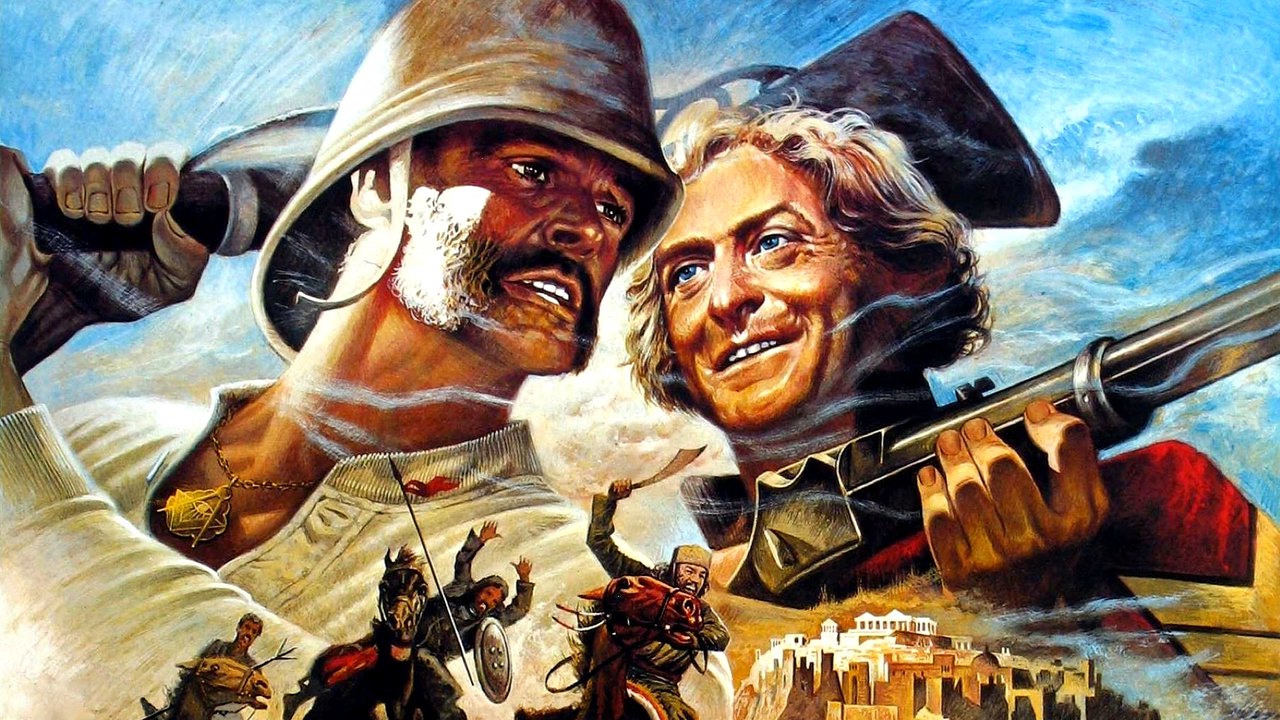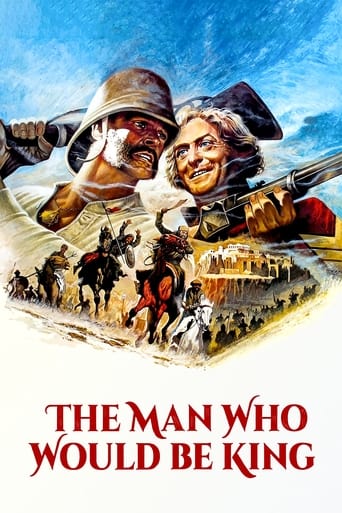

Saw quite a few movies in early 1976 and two of them stand out even after all these years: one is Barry Lyndon and the other is The Man Who Would Be King. So many people haven't heard of these films and I always recommend them. John Huston had been wanting to make this movie for years but wasn't able to until the 1970s. I think it was worth it, because he picked a great cast.It takes a while to get into The Man Who Would Be King, but once you're in, you're hooked. Danny & Peachy (brilliantly portrayed by Sean Connery & Michael Caine) are a couple of hell-raisers, stationed in India as part of the Queen's forces. They've done everything imaginable and are longing for a new adventure. They hear about a remote land beyond the mountains where no white man has gone since Alexander the Great. After almost killing themselves getting to this little place, they finally arrive--and, through a series of coincidences, Danny is crowned king. Who is he to tell the natives that they made a mistake? Danny & Peachy have a great time as the king & his consort (so to speak) until the natives find out that they've been hoodwinked; Danny is a mere mortal like everyone else. And they aren't too happy.I had to purchase the DVD because TV hardly ever showed this movie. But it's worth the price. John Huston directs a wonderful adventure story that stands the test of time.
... View MoreShowing that he hadn't lost his flair as a director, John Huston adapted Rudyard Kipling's novel "The Man Who Would Be King" to the big screen. I've never read the novel, but the movie is something to behold. Sean Connery and Michael Caine play a pair of men stationed in British India who decide to set up their own fiefdom in the remote Kafiristan. The movie isn't just an adventure story. It also shows the protagonists' arrogance ("You'll learn how to fight like civilized people!"). No surprise that things don't go quite as the men planned.It's more than a little ironic that the regions on which the movie focuses - the Afghanistan-Pakistan region - are back in the news in the 21st century. The more that things change, the more they stay the same. The protagonists should've learned a lesson from Alexander the Great's experiences in the region, as should every empire that's gone into Afghanistan.But anyway, the movie is more proof of what a great director Huston was, and what great actors Connery and Caine are (as well as Christopher Plummer, who plays Kipling). Really good one.
... View More"Maltese Falcon" director John Huston's storybook adventure saga "The Man Who Would Be King" casts Sean Connery and Michael Caine as two former British Army soldiers in 19th century India. These two scoundrels aspire to become kings in their own right in a distant land of Kafristan. Despite its downbeat ending, this ambitious saga has some amusing moments early on as the roguish pair visit the famous writer Rudyard Kipling before they march off to glory. This is an old-fashioned melodrama about a pair of mercenaries who get everything that they deserve in the long run. Nevertheless, Connery and Caine have a field day as the Queen's own until they encounter tragedy. Our protagonists masquerade as natives and enter a land where no white man has been seen since Alexander the Great in 230 B.C. They raise an army from a small ruler's kingdom and march into battle against one tyrant after another until Connery's Daniel Dravot leads a reckless charge against the enemy in their first battle against the orders of his comrade-in-arms Peachy Carnehan (Michael Caine) who reprimands him for his amateurish behavior. During the charge, an arrow plunges into Daniel's chest, but lodges harmlessly in his bandoleer and he survives. However, everybody who witnessed his exploit believe that Daniel survived because he is nothing less than divine, a god, and they fall down on their knees and worship him. Predictably, our heroes amass a fortune in gold, but Daniel begins to believe in his own divinity and makes the mistake of taking a wife. When the dame bites him during their wedding ceremony, they realize that they have cooked their collective geese. Everybody realizes that Daniel isn't a god and they sent him to his death and crucify poor Peachy. Lensed on location in sunny, sand-swept Morocco, "The Man Who Would Be King" was a life-long dream of writer & director John Huston who initially sought to make it during the Golden Age of Hollywood with Clark Gable and Humphrey Bogart.
... View MoreThe Man Who Would Be King is a great movie with a very well developed storyline and a terrific cast. It's a very entertaining adventure film that was made in a time when these type of films were rare, it was a risky at the time and required serious effort from the film makers, and it all shows here, it looks beautiful, the cinematography is stunning even for today's standards and it was clearly a very expensive production. The biggest flaw is that it's predictable, once the two main characters make it to India, everything from their can be told twenty minutes in advance, we knew what would end up happening to each character, there isn't any unexpected twist that takes the audience away, and it's predictability is the reason why I'm giving this an eight instead of a nine that it easily could have received. The cast is terrific, particularly Sean Connery and Michael Caine, of course, the chemistry between them is spectacular, they seemed very comfortable performing together and it's a pleasant experience to see these two movie icons in the same film. A swashbuckling adventure with stunning scenery and great acting, the Man Who Would Be King is worth the watch for anyone looking for a good adventure film. Two British soldiers in colonial India venture to uncharted realms in search of wealth and power. Best Performance: Michael Caine Worst Performance: Albert Moses
... View More